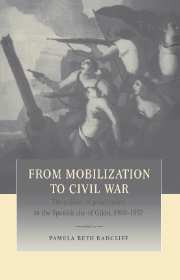Book contents
- Frontmatter
- Contents
- List of maps
- List of tables
- Acknowledgments
- Glossary of terms and abbreviations
- Introduction
- 1 A turning point: the city in 1900
- PART I Patterns of life in working-class Gijón
- PART II Institutional forces of opposition: republicans and anarchosyndicalists
- PART III Defining an oppositional culture: the struggle over the public sphere
- PART IV The urban battlefield: conflict and collective action, 1901–1936
- Conclusion
- Appendix 1 Wage and price movement
- Appendix 2 Occupations by status category
- Appendix 3 Supplementary tables
- Select bibliography
- Index
Conclusion
Published online by Cambridge University Press: 31 October 2009
- Frontmatter
- Contents
- List of maps
- List of tables
- Acknowledgments
- Glossary of terms and abbreviations
- Introduction
- 1 A turning point: the city in 1900
- PART I Patterns of life in working-class Gijón
- PART II Institutional forces of opposition: republicans and anarchosyndicalists
- PART III Defining an oppositional culture: the struggle over the public sphere
- PART IV The urban battlefield: conflict and collective action, 1901–1936
- Conclusion
- Appendix 1 Wage and price movement
- Appendix 2 Occupations by status category
- Appendix 3 Supplementary tables
- Select bibliography
- Index
Summary
After years of hegemonic struggle, the outbreak of civil war in July 1936 finally gave “smoke-darkened” Gijón the opportunity, albeit briefly, to wrest power from the hands of the elites and embark on a revolutionary experiment in popular empowerment. The experiment was constrained by political infighting, by the exigencies of the war and by lack of resources. Aborted before it reached maturity and crippled by problems outside local control, it is impossible to predict how it would have continued to evolve. What is clear, however, is that the aspirations of the regime echoed those articulated over several decades of mobilization by a variety of popular groups and organizations. The revolution that unfolded contained elements of anarchism, socialism, republicanism and even communism, but what seemed to drive it was not any specific ideology but the familiar struggle for community empowerment and the little man's/woman's right to equal citizenship and a decent life. From this perspective, the political experiment of 1936–1937 was both the culmination of and the response to a long tradition of popular mobilization.
Taking the lead in this experiment was the CNT, whose rhetoric of polarization captured the mood of a city and country at war with itself. Once the military uprising opened the floodgates of political change, the already weak republican legitimacy collapsed and the more powerful leftist forces pushed forward with their urgent vision of change. De facto power shifted immediately, when the trade unions organized the physical defense of the city from the military rebels, and even after the surrender of the rebels on August 21st, the republicans never regained more than an auxiliary status in the regime.
- Type
- Chapter
- Information
- From Mobilization to Civil WarThe Politics of Polarization in the Spanish City of Gijón, 1900–1937, pp. 305 - 314Publisher: Cambridge University PressPrint publication year: 1997



